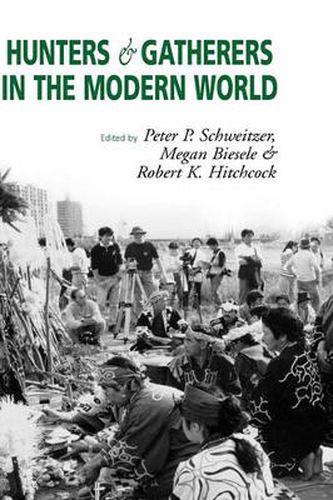Readings Newsletter
Become a Readings Member to make your shopping experience even easier.
Sign in or sign up for free!
You’re not far away from qualifying for FREE standard shipping within Australia
You’ve qualified for FREE standard shipping within Australia
The cart is loading…






This title is printed to order. This book may have been self-published. If so, we cannot guarantee the quality of the content. In the main most books will have gone through the editing process however some may not. We therefore suggest that you be aware of this before ordering this book. If in doubt check either the author or publisher’s details as we are unable to accept any returns unless they are faulty. Please contact us if you have any questions.
In an age of heightened awareness of the threat that western industrialized societies pose to the environment, hunters and gatherers attract particularly strong interest because they occupy the ecological niches that are constantly eroded. Despite the denial of sovereignty, the world’s more than 350 million indigenous peoples continue to assert aboriginal title to significant portions of the world’s remaining bio-diversity. As a result, conflicts between tribal peoples and nation states are on the increase. Today, many of the societies that gave the field of anthropology its empirical foundations and unique global vision of a diverse and evolving humanity are being destroyed as a result of national economic, political, and military policies.
Although quite a sizable body of literature exists on the living conditions of the hunters and gatherers, this volume is unique in that it represents the first extensive east-west scholarly exchange in anthropology since the demise of the USSR. Moreover, it also offers new perspectives from indigenous communities and scholars in an exchange that be termed south-north as opposed to
north-north, denoting the predominance of northern Europe and North America in scholarly debate.
The main focus of this volume is on the internal dynamics and political strategies of hunting and gathering societies in areas of self-determination and self-representation. More specifically, it examines areas such as warfare and conflict resolution, resistance, identity and the state, demography and ecology, gender and representation, and world view and religion. It raises a large number of major issues of common concerns and therefore makes important reading for all those interested in human rights issues, ethnic conflict, grassroots development and community organization, and environmental topics.
$9.00 standard shipping within Australia
FREE standard shipping within Australia for orders over $100.00
Express & International shipping calculated at checkout
This title is printed to order. This book may have been self-published. If so, we cannot guarantee the quality of the content. In the main most books will have gone through the editing process however some may not. We therefore suggest that you be aware of this before ordering this book. If in doubt check either the author or publisher’s details as we are unable to accept any returns unless they are faulty. Please contact us if you have any questions.
In an age of heightened awareness of the threat that western industrialized societies pose to the environment, hunters and gatherers attract particularly strong interest because they occupy the ecological niches that are constantly eroded. Despite the denial of sovereignty, the world’s more than 350 million indigenous peoples continue to assert aboriginal title to significant portions of the world’s remaining bio-diversity. As a result, conflicts between tribal peoples and nation states are on the increase. Today, many of the societies that gave the field of anthropology its empirical foundations and unique global vision of a diverse and evolving humanity are being destroyed as a result of national economic, political, and military policies.
Although quite a sizable body of literature exists on the living conditions of the hunters and gatherers, this volume is unique in that it represents the first extensive east-west scholarly exchange in anthropology since the demise of the USSR. Moreover, it also offers new perspectives from indigenous communities and scholars in an exchange that be termed south-north as opposed to
north-north, denoting the predominance of northern Europe and North America in scholarly debate.
The main focus of this volume is on the internal dynamics and political strategies of hunting and gathering societies in areas of self-determination and self-representation. More specifically, it examines areas such as warfare and conflict resolution, resistance, identity and the state, demography and ecology, gender and representation, and world view and religion. It raises a large number of major issues of common concerns and therefore makes important reading for all those interested in human rights issues, ethnic conflict, grassroots development and community organization, and environmental topics.